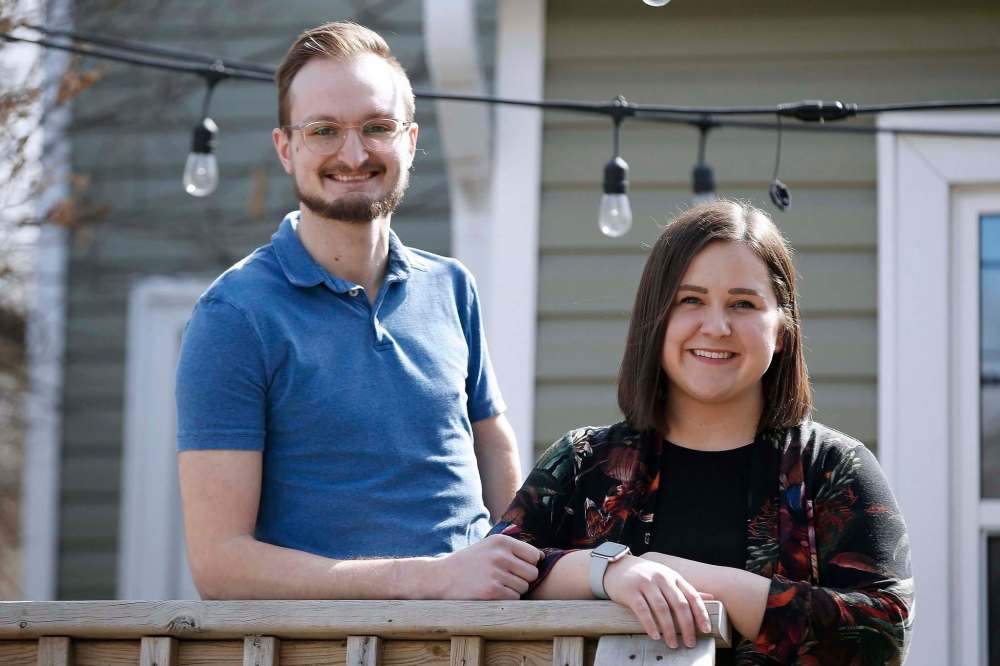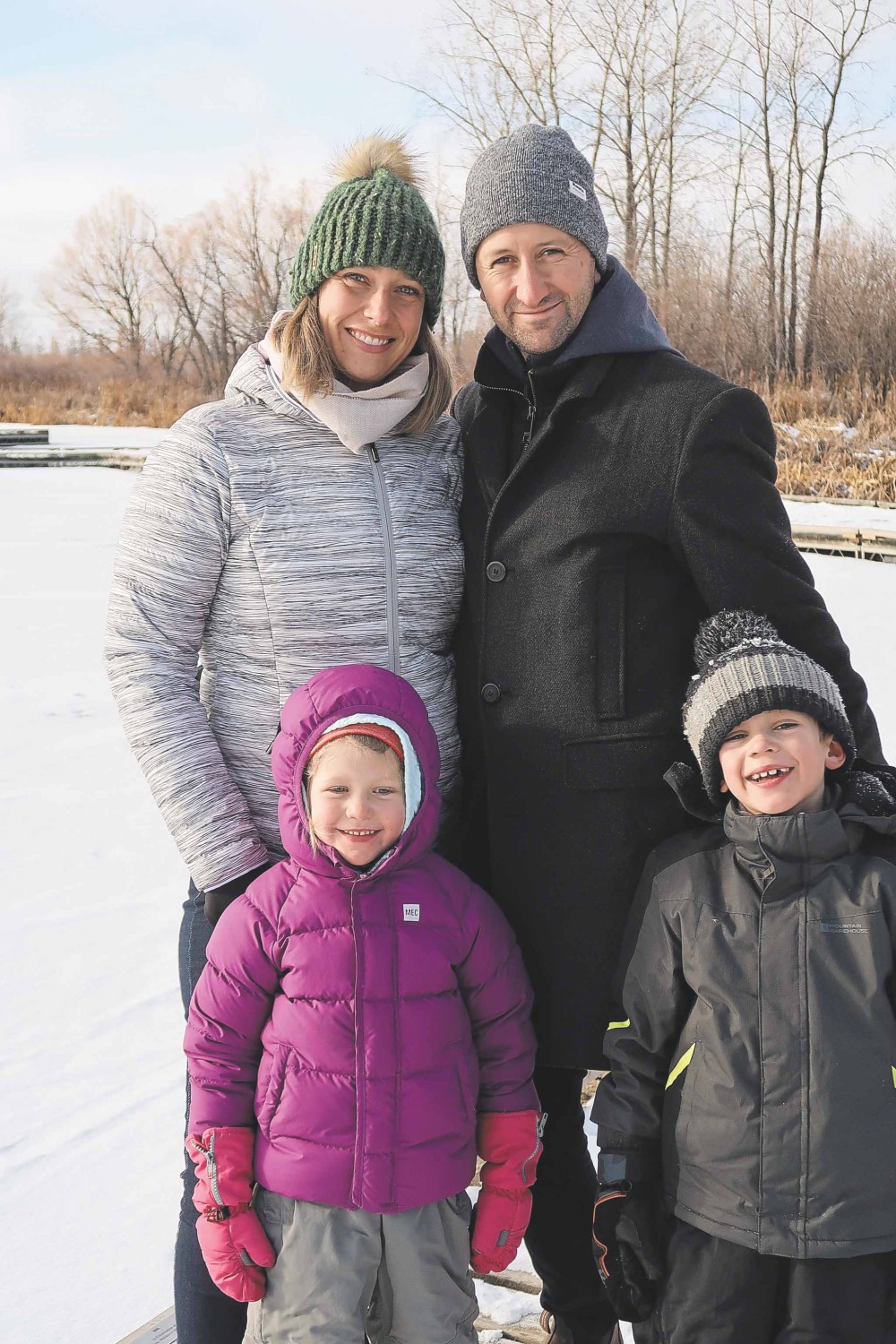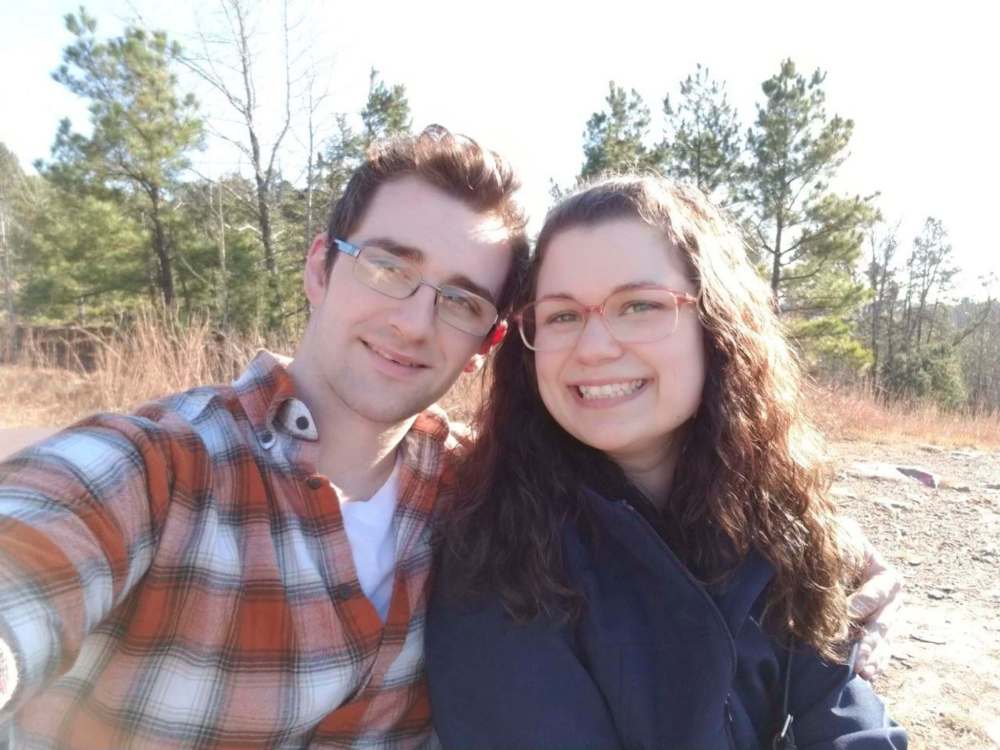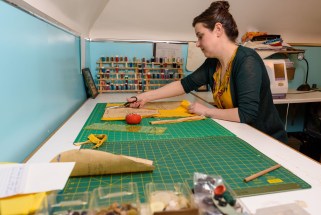The love bug Virus is testing the patience of parents, the novelty of newlywed bliss and the fortitude of fiancés. Single? Fuggedaboutit
Read this article for free:
or
Already have an account? Log in here »
To continue reading, please subscribe:
Monthly Digital Subscription
$0 for the first 4 weeks*
- Enjoy unlimited reading on winnipegfreepress.com
- Read the E-Edition, our digital replica newspaper
- Access News Break, our award-winning app
- Play interactive puzzles
*No charge for 4 weeks then price increases to the regular rate of $19.00 plus GST every four weeks. Offer available to new and qualified returning subscribers only. Cancel any time.
Monthly Digital Subscription
$4.75/week*
- Enjoy unlimited reading on winnipegfreepress.com
- Read the E-Edition, our digital replica newspaper
- Access News Break, our award-winning app
- Play interactive puzzles
*Billed as $19 plus GST every four weeks. Cancel any time.
To continue reading, please subscribe:
Add Free Press access to your Brandon Sun subscription for only an additional
$1 for the first 4 weeks*
*Your next subscription payment will increase by $1.00 and you will be charged $16.99 plus GST for four weeks. After four weeks, your payment will increase to $23.99 plus GST every four weeks.
Read unlimited articles for free today:
or
Already have an account? Log in here »
Hey there, time traveller!
This article was published 07/04/2020 (2076 days ago), so information in it may no longer be current.
Love in the time of COVID-19 isn’t easy.
Communication key
This period of self-isolation and all this, um, sustained togetherness can be hard on relationships in ways that might be confusing. You love your partner, so why are they getting on your every last nerve?
“This is a bit of a big experiment because we don’t have as much research on couples isolation as we do on individual isolation,” says Dr. Syras Derksen, a Winnipeg-based registered psychologist who works closely with couples. “We’re going to be able to really see more how this affects couples. There’s a lot of information we can use to make good guesses as to what’s going to happen for couples during this time.
This period of self-isolation and all this, um, sustained togetherness can be hard on relationships in ways that might be confusing. You love your partner, so why are they getting on your every last nerve?
“This is a bit of a big experiment because we don’t have as much research on couples isolation as we do on individual isolation,” says Dr. Syras Derksen, a Winnipeg-based registered psychologist who works closely with couples. “We’re going to be able to really see more how this affects couples. There’s a lot of information we can use to make good guesses as to what’s going to happen for couples during this time.
“One of those would be that we would expect couples to have problems because we manage our social situations,” he says. “Most of us are not actually introverts and extroverts — most of us are ambiverts, so we’re in the middle. We’ll manage our social world by having more and then having less. You can’t say some people like social interactions and others don’t; all of us want more sometimes, and then less, and we manage that on an hour-by-hour, day-by-day basis.”
Managing that social load is tough when you’re around someone all the time. Structuring your days to include a mix of time together, time alone, and time with others is important.
“If you’re really in close quarters, you might need to break some social conventions that we have around, like, ‘I’m in the same room as you so I get to talk to you.’ No, this is my alone time, even though we’re in the same room. You’re going to have to talk about things you don’t normally talk about, how you need your own space. And that might be hard for some couples.”
Communication is also key, but that doesn’t mean it should be constant.
“One of the most asked-for things when people come to couple’s counselling is help with their communication,” Derksen says. “One of the ways I help people manage that is by taking less. Don’t get me wrong — I want couples to talk to each other and talk well — but I want them to talk on things that are helpful.”
That means instead of having a million annoying conversations about who should deal with the laundry or groceries, for example, couples could have one conversation in which all those decisions are made. “The big solution for a lot of this is structure, so they don’t have to talk about whose doing the dishes because it’s already been decided. You don’t have to talk about when the garbage is going out because you’ve already decided.”
Derksen points out that this experience will bring up a lot of feelings that may be surprising, and that different people in a couple will respond to the individual, community and global stressors of a crisis in different ways.
“They’re going to be surprised by grief, by anger, by not wanting to be around their partner. Learning to navigate feelings that haven’t happened in that context before is going to be real, so trying to learn quickly about what you need in that time and be able to communicate it in an open way is going to be really important.”
Derksen says the effects the pandemic will have on couples will be felt later, after it’s over. He points to the surge of new couples he sees in January after the holidays, which are a high-stress, pressure-filled time in which couples are cooped up together (sound familiar?) “So, what I’m expecting is that this will be like a really tough Christmas,” he says.
Still, it’s not all doom and divorce.
“I have actually had clients who have had improvements in their relationships in this time,” he says. “They’ve come together and some of the other things that distracted them from each other have now faded away. They thought they hated each other but they’re finding that if they actually pay attention to each other, they’re doing better than they thought. I have no idea which reality is winning out in society right now, but I’ve seen that first-hand.”
— Jen Zoratti
Maybe you were single and ready to mingle, only to have the mood killed by physical distancing measures. Maybe you just started dating someone and now must isolate separately. Maybe your marriage is being tested by the fact you are now co-workers and, if you have kids, co-teaching assistants. Maybe all this togetherness is casting the person you love in a new light. Maybe one of you gets sick.
It isn’t always a struggle, either. Maybe new challenges are leading to newfound resilience, strengthened bonds, renewed partnerships. Maybe it looks like a valentine — There’s no one I’d rather be quarantined with than you — or maybe it looks like teamwork.
Here are four stories from Winnipeggers on how they are navigating romantic relationships — or lack thereof — during a global pandemic.
• • •
Before physical distancing measures put her dating life on pause, Raquel Bracken went on a few dates in early March — an eternity ago in COVID-19 time — and noticed something about the way people were using the word “coronavirus.”
“I went on this date, and it was OK. At the end of it, he tried to kiss me, and I was like, ‘Oh, maybe not, coronavirus,’ and that was my out,” she says with a laugh over the phone. “And then I texted somebody else casually and he was like, ‘Oh, I think it’s time to be prudent in this pre-pandemic time.’
“And I realized, coronavirus is the code word for ‘Not that interested in you’ right now. OK, got it.”
It was a more innocent time, early March. Now, Bracken, 32, is taking physical distancing very seriously — “as everyone should,” she says — which means no dating. At all. Including virtually. She’s investing time in her other relationships.
“And I realized, coronavirus is the code word for ‘Not that interested in you’ right now. OK, got it.” – Raquel Bracken
“I’m not dating right now for two reasons,” she says. “One, I feel like life is full-up right now. I’m way more concerned about my community, and how my friends and family are coping, than dating. That level of care is a full-time job on top of my full-time job. And two, taking physical distancing seriously, I think there will be a more safe and appropriate time later to be seeking out intimacy.”
Bracken points out that with the absence of public spaces right now, meeting someone new is also riskier. “Do I really want to go for a walk with a near-perfect stranger on a quiet residential street?”
Bracken’s been working from home and self-isolating for the past three weeks and, though she lives alone, she hasn’t been lonely: she’s been active on Zoom with friends and family, setting up Netflix viewing parties, staying busy.
Plus, she has a new four-legged social-distancing pal to keep her company: a cat named Lynx, on loan from a friend. “I was tempted to rename him Dr. Fauci (after America’s top infectious-disease expert),” she says with a laugh, “but I didn’t.
“I feel like it’s done wonders for my mental health, to have another affectionate living thing around that’s distracting and fun.”
• • •

For Janelle and Chris Malkiewicz, living through the pandemic has been something of a newlywed bootcamp.
The couple got married in September, and didn’t live together before they said “I do.” Now, they are around each other all day, every day.
“We’re getting to know each other even more,” says Janelle, 25, over speakerphone.
“It’s not bad, actually,” adds Chris, 26, making his wife laugh. “It’s different, right? We got married and we sort of kept living our single lives, but living at the same place and married. So we were doing all the activities we were doing before. There wasn’t a huge amount of time at the dinner table chatting. Now, obviously, everything has been shut down, so I don’t go play floor hockey once a week, I don’t go to Polish folk dancing practice twice a week. It’s been a lot more really getting to know each other and how we live, and all the little intricacies.”
Previously, the Malkiewiczes were the kind of couple who shared a jam-packed Google calendar. Both are relishing the chance to slow down a bit.
“I always liked the idea of being the type of people that sit down at the table together, and now we’re able to do that,” Janelle says. “I like cooking, and I like coming up with meals to make for dinner every night, and I like saying, ‘dinner is on the table,’ and having the time to sit and eat.”
The couple recently got their wedding photos back from the photographer, which has stirred up some mixed emotions for Janelle.
“I’m posting them (on social media) because I’m excited, but there is a part of me that feels insane guilt because I see the people around me who are having to cancel their weddings, postpone their weddings, have a ceremony with just witnesses,” she says. “A huge wave of gratitude has come over me that we got that done.”
That gratitude extends to the little things they’ve been able to do during the strange blessing that has been this time. The hour-long walks. The shared meals. A chance to really connect at a time when their marriage is still so new.
“It’s a good time to reassess,” Chris says. “It makes you remember what’s important.”
• • •
“Oh God, do I miss school.”
Aimee Goyer and her husband of 10 years, Ian, are balancing working, parenting, and now, the homeschooling of their children, Isaac, 7, and Ellice, 5.

“I miss the teachers. They do such a good job,” says Goyer, 38. “Being a teacher is not my calling and I’m finding it to be a very challenging time in terms of my patience and my relationships with my kids, having to homeschool them. All the power to the teachers, who are doing a great job remotely, too. We’re getting so much support from our teachers, it’s incredible.”
She says her kids are doing well. “They think it’s kind of exciting and adventure. They don’t listen to us the way they’d normally listen to a teacher, so that’s been a struggle. But otherwise, they’re rolling with it.”
Every day feels like a week, Goyer says. “But we’re just plugging along.”
She admits that with young kids, she and Ian were spending a lot of time at home anyway.
“We’re homebodies, so I think for us it hasn’t been that different… I think for some of our friends who are used to eating out at restaurants a lot or going out or hanging out with their friends, this is a much more challenging time.
“We’re doing fine with the whole being stuck together all day, every day thing.”
As a couple, they’ve found success in working as a team, trying to divide the labour of housework and homeschooling equally. “We basically see who has conference calls at what time and try to structure our day accordingly.”
Goyer says it’s important to take time to do stuff separately, and have interactions with people besides each other. Her advice to other couples navigating this time with young children is simple: “Share the load.”
• • •

Sam Lucier is used to seeing her fiancé, Ryan, through a screen.
Lucier lives in Winnipeg, her partner lives in Arkansas. The couple met in 2016 through an online video game and started dating long distance; he came to Winnipeg met her family a year later.
In December 2018 they got engaged, and Lucier, 26, decided that she’d make the move to the States. “It was getting expensive and it was getting hard with vacation hours to travel back and forth,” she says.
In February 2019, she began the 10-month saga that was obtaining a K-1 Visa, a.k.a. the fiancé visa, which is issued to the fiancé(e) of a U.S. citizen in order to enter the United States. “I don’t know if you’ve heard of the show 90 Day Fiancé, but it’s the same process,” Lucier says.
That process is expensive, requiring trips to the consulate in Montreal as well as to Toronto for a medical exam. There are also firm deadlines attached to it: Lucier must marry her fiancé within 90 days of her arrival in the States, and her visa is only valid for six months.
Finally, in December 2019, she got her passport with the visa in it. The expiration date: April 21, 2020.
“Our future changed, but our normal hasn’t changed. We’re used to being apart, we’re used to talking online and playing games together. We just need to wait it out. The whole world is waiting everything out.” – Sam Lucier
And so, Lucier began tying up her life in Winnipeg, quitting her job and subletting her apartment. They decided she’d have everything wrapped up by March 31, when Ryan would pick her up and they’d drive to the U.S. and get married there.
Travelling in March, Lucier had planned for bad weather. Never in a million years did she think a global pandemic would completely derail her life.
“My job was over March 20, and I already sublet my apartment,” she says (she’s currently crashing on her double bed in her mom’s living room). “I cancelled all my services. I cancelled my life here so I could start a new one. And then we started hearing all these scary things about border closures and the virus itself; they’re telling you not to leave or travel. It made me nervous. And then there’s my deadline.”
The only advice she has received from the consulate was to use her visa before it expires in two weeks, which she knows won’t be possible.
Lucier says this experience has been hard on her relationship. “Things were kind of rocky at first,” she says. “We planned so long for this, and then it was like, ‘What do we do now?'”
Still, they are trying to take living in limbo in stride.
“Our future changed, but our normal hasn’t changed,” she says. “We’re used to being apart, we’re used to talking online and playing games together. We just need to wait it out.
“The whole world is waiting everything out.”
jen.zoratti@freepress.mb.ca
Twitter: @JenZoratti

Jen Zoratti is a Winnipeg Free Press columnist and author of the newsletter, NEXT, a weekly look towards a post-pandemic future.
Our newsroom depends on a growing audience of readers to power our journalism. If you are not a paid reader, please consider becoming a subscriber.
Our newsroom depends on its audience of readers to power our journalism. Thank you for your support.






